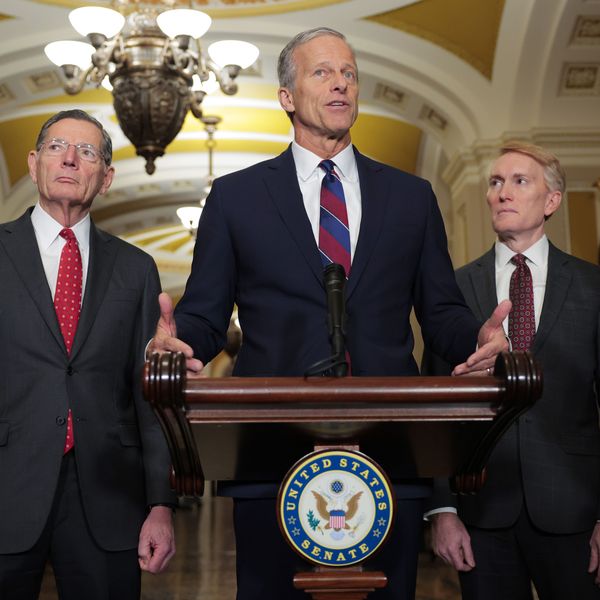Handing a victory for President Barack Obama and the Affordable Care Act--as well as millions of people who gained more affordable healthcare under the law--the U.S. Supreme Court on Thursday ruled that individuals who get their health insurance through an exchange established by the federal government will continue to be eligible for tax subsidies.
The "ALEC-fueled" case, King v. Burwell, dealt with whether the Affordable Care Act provides subsidies to everyone in the country who qualifies for them on the basis of income level, regardless of whether they get their insurance through a state-run exchange or an exchange run by the federal government. Basing their argument on just four words buried in the massive legislation, the plaintiffs claimed that subsidies were supposed to be only for those purchasing health care through state-run health exchanges--not the federal one.
Experts warned that a finding in favor of the plaintiffs would eviscerate the healthcare law.
Affirming the decision of the Fourth Circuit, the justices voted 6-3 to uphold the subsidies. Chief Justice John Roberts, as well as Justices Anthony Kennedy, Ruth Bader Ginsburg, Stephen Breyer, Sonia Sotomayor, and Elena Kagan were in the majority.
Here's how SCOTUS Blog described "the core of the dispute:"
[T]o ensure that everyone can afford the health insurance that they are now required to buy, the ACA also provides for subsidies for people who buy their health insurance through an exchange. But one provision of the ACA indicates that subsidies are only available if you purchase your health insurance on an exchange "established by the State." The plaintiffs in this case argue that subsidies are therefore not available if you are one of the roughly seven million people who buy their health insurance on an exchange established by the federal government, because the federal government is not a "State." Defending the subsidies, the federal government argues that, if you look at the entire ACA and its history, it is clear that the subsidies are available to everyone who purchases insurance on an exchange, no matter who created it - including because the plaintiffs' reading could mean the end not just of the subsidies, but the entire health-insurance system created by the ACA.
About 6.4 million people are receiving subsidies in more than 30 states where the marketplace is run by the federal government. In a piece published Thursday, the New York Times asked one simple--but critical--question: "Have the subsidies succeeded?"
"By many measures, the answer is yes," wrote Times journalists Margot Sanger-Katz and Robert Pear. "More than seven million people are enrolled in the federal health insurance marketplaces, and a majority of them--87 percent--receive subsidies in the form of tax credits to help pay their premiums, the government says. Without subsidies, many would be unable to buy insurance."
They continued: "The subsidies also appear to have drawn substantial numbers of younger, healthier Americans into the new insurance markets, stabilizing premiums, even for people who pay the full cost themselves."
Of course, they add, "The effectiveness of the subsidies is separate from the question of whether they are legal."
Speculating on the potential impact of a ruling for the plaintiffs--against the ACA subsidies--Sanger-Katz and Pear wrote:
The effects would be felt around the country, but disproportionately in the South. More than three million people are receiving subsidies in four states that use the federal exchange: Florida, Georgia, North Carolina and Texas. In Florida alone, 1.3 million people -- more than 8 percent of the population under 65 -- receive subsidies to buy insurance.
However, some have maintained all along that King v. Burwell merely underscored the need for a single-payer system.
"Because of the ACA's administrative complexity and flaws--largely reflecting its accommodation to the private health insurance industry and other corporate, profit-oriented interests in U.S. health care--it is particularly vulnerable to the kind of legal challenge we saw today," said Physicians for a National Health Program president Robert Zarr.
"In contrast," he continued, "a single-payer system--an improved Medicare for All--would achieve truly universal care, affordability, and effective cost control. It would put the interests of our patients--and our nation's health--first."
And while he praised the Supreme Court ruling for not throwing millions off health insurance, Sen. Bernie Sanders (I-Vt.) added: "What the United States should do is join every other major nation and recognize that health care is a right of citizenship. A Medicare-for-all, single-payer system would provide better care at less cost for more Americans."


